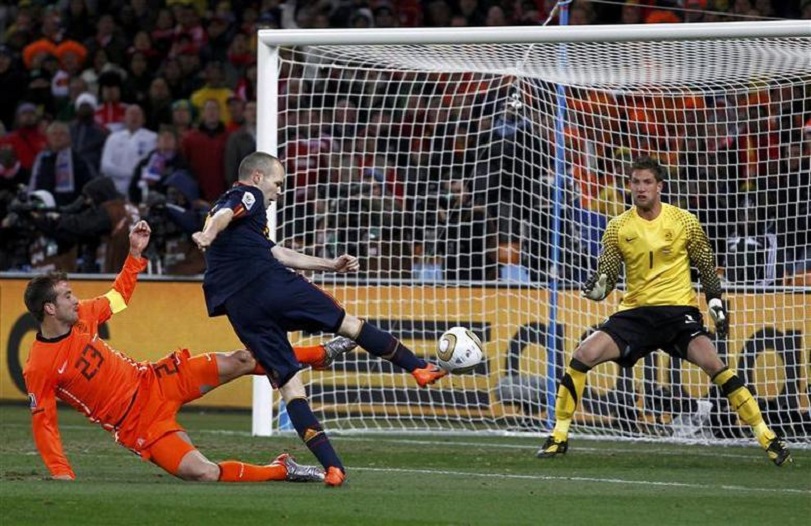Sports
Exciting Soccer Matches From the Past

Who doesn’t love a good sports match? We all know that there’s something about the feeling of watching a competitive game, especially a soccer match, which makes it impossible to take your eyes off the screen.
It’s like time suddenly comes to stand still as you witness some of today’s legends clashing against each other on their path towards glory. Now, let’s look at some exciting moments from historically important soccer matches and the context surrounding these thrilling games.
Brazil vs. Germany, 2014 World Cup Semifinal – An epic battle between two soccer powers that ended in a heartbreaking loss for Brazil
The 2014 World Cup Semifinal between Brazil and Germany was a highly anticipated matchup between two of the world’s soccer powerhouses. Fans from all over the globe tuned in to witness what was expected to be a thrilling game. However, what transpired on the field was anything but thrilling for the Brazilian side.
In a turn of events that shocked soccer fans worldwide, Germany dominated the match and ended up defeating Brazil by a staggering score of 7-1. It was a heartbreaking loss for Brazil, for whom soccer is more than just a sport, but a way of life. The game will be forever remembered as one of the most historic and dramatic matches in World Cup history and without a doubt, there will be only a handful football bettors who saw that coming.
Netherlands vs. Spain, 2010 World Cup Final – A thrilling match in which the Spanish took home the title with a dramatic late goal
Besides Germany, there are European teams, which this blogpost discusses. The 2010 World Cup was a stunning tournament, with fans around the globe on the edge of their seats as the best teams in the world fought tooth and nail on the pitch. But perhaps no match in that epic contest was more breathtaking than the final showdown between the Netherlands and Spain.
From the opening whistle, both teams gave it their all, with ferocious tackles, breathtaking runs and countless scoring opportunities. In the end, it was the Spanish who triumphed, stunning the Dutch team and their supporters with a dramatic late goal that secured the title once and for all. It was a match for the ages, one that left fans breathless and cemented the Netherlands’ status as a world-class football powerhouse.
Italy vs. France, 2006 World Cup Final – After 120 minutes of brilliant defense from both sides, Italy won on penalties
The 2006 World Cup Final between Italy and France is still talked about as one of the most thrilling matches in football history. The two teams battled it out for 120 intense minutes, with both sides displaying their brilliance in defense. The match went into penalties, and it was there that Italy came out on top.
The tension in the stadium was palpable, with fans on the edge of their seats as each penalty was taken. In the end, Italy emerged victorious, and their fans erupted in joy. This match will always be remembered as a classic showdown between two of the world’s greatest football nations.
Barcelona vs. Real Madrid, 2011 Champions League Semi-Finals – One of the most intense rivalries in sports where Barcelona knocked out their arch rivals
The Barcelona vs. Real Madrid rivalry is legendary in the world of sports, and the 2011 Champions League Semi-Finals matchup was no exception. Fans around the globe were on the edge of their seats as these two powerhouse teams faced off in a battle of epic proportions.
In the end, Barcelona emerged victorious, knocking out their arch rivals and solidifying their status as one of the top teams in the world. The intensity of this rivalry is unmatched, and this match was no exception, leaving fans buzzing long after the final whistle blew.
Manchester United vs. Bayern Munich, 1999 Champions League Final – The “Miracle of Barcelona,” when an injury-plagued Man Utd stunned Bayern to win their second European Cup
The 1999 Champions League final between Manchester United and Bayern Munich is a match that will forever be etched in the memories of football fans worldwide. Known as the “Miracle of Barcelona,” it was a game of high drama and excitement, with both teams giving their all in pursuit of European glory.
However, it was the injury-plagued Manchester United that emerged as the unlikely victors, stunning Bayern in the dying moments of the game to win their second European Cup.
This match is a testament to the spirit and determination of the United team, who refused to give up until the final whistle. It remains one of the greatest moments in the history of the sport, and a true example of the power of teamwork and perseverance.
England vs. Argentina, 1998 World Cup Round of 16 – Tense battles between two teams that went all the way to penalty kicks and eventually saw England through
The 1998 World Cup Round of 16 match between England and Argentina was a nail-biting clash that will forever be etched in the memories of football fans. It was a tense battle between two teams that refused to back down. Despite the intense pressure, both England and Argentina put up a spirited fight, refusing to give an inch.
The match eventually went all the way to penalty kicks, with both teams giving it their all. In the end, it was England who triumphed, thanks to the heroics of their goalkeeper David Seaman. It was a match that showcased the very best of football, and one that will go down in history as a classic encounter.
Sports
How Nigeria’s New Tax Rules Could Reshape Sports Betting

As 2024 comes to a gradual end and companies begin to make plans for the new year, the Nigerian sports betting industry is faced with a new year’s resolution which it didn’t make but has been imposed on it by this political administration- the dilemma of withholding tax regulations.
The introduction of this new tax regime could fundamentally alter the sports betting landscape, affecting everything from operator profits to punter behaviour and industry growth.
Once the new regulations come into effect on January 1, 2025, eligible transactions for winnings in i-gaming shall incur applicable rates of 5% for residents and 15% for non-residents.
For Managing Partner, WYS Solicitors & Legal Counsel Africa, Olafadeke Akeju, the fact that i-gaming is largely online means this new tax regime may cause of exodus of customers from licensed operators to illegal remote operators, due to the uncaptured and unprotected nature of the digital space:
“For those who are unlicensed and foreign operators, they will still be able to owe tax to players and offer better odds and better returns because there is no deduction or withholding tax. What this means is that licensed operators will lose customers to the illegal and remote operators, that is the likely implication, as there could be a significant drop in patronage once this withholding tax kicks off.”
Akeju also struggles to understand how this tax would apply to walk-in customers who mostly require age verification but may not require identity verification- especially because this regulation exempts over-the-counter transactions.
Velex Advisory Tax Expert, Jonathan Nwanze is also keen to see how this tax regime would be implemented, but he is more worried about the likelihood that the Tinubu administration, “could be creating a monster asking for remittance without the capacity to check it.”
Nwanze explains that the introduction of withholding tax is not novel, as it occurs in other countries in West Africa like Ghana. However, what makes Nigeria’s exceptional is the timing, investment and the market size:
“It’s not the first time it’s been introduced. However, some of the aforementioned markets cannot be compared to the Nigerian market in terms of size, Nigeria is way bigger. Some are more regulated because of the kind of structure they have. For instance, in Ghana, there are regions, not states and there is one revenue collection body. In Nigeria, we have states, but numerous bodies at various levels of government collect revenue. I think the government has to invest in a lot of technology. If they are looking at getting a lot out of gaming, there must be investment in infrastructure,” Nwanze told sports and betting news site, SportsBoom.com.
What’s the rush?
Nigeria’s economy has been on a steady decline due to a number of factors including the poor timing of policies. For the implementation of withholding tax, it’s equally symptomatic of poor timing, grey areas and an inherent lack of understanding about the i-gaming ecosystem.
Akeju explains that in order for betting operators to comply with the provisions of the new tax regime, there must be upgrades across the betting platforms and since the software/ platform providers aren’t local, the operators need to get in line for an estimated 6 to 9 months before their platforms are upgraded.
She thinks it’s highly likely that: “we could potentially have a situation whereby on the 1st of January 2025, operators won’t be able to comply due to circumstances beyond their control.”
Apart from playing the waiting game, the cost of upgrading betting platforms equally poses a huge financial burden. Akeju explains that while larger betting operators own their betting platforms, the same cannot be said for smaller operators:
“The platforms which smaller operators use for gaming are owned by third parties with whom they have white label agreements. Hence, implementing the withholding tax right now is going to be a challenge for those operators as it would require them to pay for developers, pay for customization and pay for integration of the platforms to suit the regulation in question.”
An eternal optimist may ask, What about alternative revenue streams? Is there any that betting companies could explore to offset the impact of these new taxes? Akeju makes it clear that the operators are caught between a rock and a hard place- that’s because offering a new product translates to applying for another license for the product in question.
Sadly, the alternative products’ providers are primarily based in Europe, which means more cost would be incurred by the operator in Euros.
Akeju is very concerned about how the smaller operators will keep their customers and while she may not have a universal solution for the Nigerian i-gaming industry as a whole, she may have a potential solution for bigger operators, but that entails their willingness to assume a sacrificial role by choosing to “absorb this withholding tax on behalf of their players or offer certain bonuses and promotions that could boost winnings so that players do not really feel the effect.”
A misconception & an opportunity
On Friday, November 22, 2024, the Supreme Court nullified the National Lottery Act and scrapped the National Lottery Regulatory Commission (NLRC). During a crucial meeting held days before the judgment, the Director General of the now defunct NLRC, Lanre Gbajabiamila, made a profound statement about the assumption that the i-gaming industry is a billion-dollar industry:
“How do we know it’s a billion-naira industry? There’s no data to show. Anybody can say it’s worth billions of naira, but until we have proper data, we can’t safely say what the industry is worth.”
Just like Gbajabiamila, this is a perception which Nwanze seeks to correct, and he thinks it may have a lot more to do with this new regulation than we realize:
“The government appears to be keen on generating revenue, but the challenge lies with the timeline – Jan 2025 is not feasible. If you look at best practices as is the case in the UK- there is no collection of withholding tax and that’s because the responsibility of taxes should sit with the company that owns the business. The reason is that the companies make more profit than the players. If you look at the number of losses compared to winnings, you’ll be shocked at how high the former is compared to the latter. In fact, the way the business is structured, it’s from those losses that winnings are paid. I think the government should review its position and opt for more engagement regarding the nature, implementation, application and configuration of this plan.”
Now that the NLRC has been dissolved, there might be an opportunity for states that may choose to opt out of this tax and while the implementation has yet to play out, Nwanze thinks that some states may see exemption as an opportunity to attract more betting companies to their states.
Legal options & absence of meaningful stakeholder engagement
With all the negative hits that the Nigerian i-gaming industry has taken in 2024, is it simply at the mercy of the government policies/ regulations, or could legal options be explored to push back? Akeju explains that “the law is made for man and not vice versa.”
While she is hopeful that the government will do a 180 when it sees the negative impact this tax will have, as was the case in the most regulated market in the world- the UK; she is fearful of Nigeria’s reputation and pace when it comes to repealing laws and regulations.
Akeju recalls attempts made by stakeholders to dialogue with the government on this matter and narrates a scenario which is reminiscent of intentional exclusion until a decision was made:
“The association of Nigerian bookmakers engaged with the presidential committee on fiscal policies and tax reforms. We had a few meetings, but it appeared as though by the time the industry was aware of many of the decisions that were taken by the government, it was at an advanced stage. Now that it has been passed, efforts are still being made for a guidance note to clarify some of the grey areas.”
Akeju and Nwanze make their final appeal by asking the government to focus its taxation efforts on the operators and not the players to make for a more streamlined and better-defined application that is understood by all involved.
Conclusion
As Nigeria’s sports betting industry braces for the 2025 withholding tax storm, both legal and tax experts sound a unified alarm: taxing players instead of operators could backfire spectacularly.
With Akeju warning of an exodus to illegal operators and Nwanze questioning the government’s monitoring capacity, the consensus is clear – this rushed regulation could transform Nigeria’s gaming landscape into a wild west of unregulated betting.
The irony? In pursuing additional revenue, the government might end up with a smaller piece of an increasingly fragmented pie. As the countdown to January 2025 begins, the industry’s message is simple: hit pause, rethink the approach, and focus on operators, not players.
Sports
The Future of Betting With Blockchain and Artificial Intelligence at 1win Bet

In the ever-evolving landscape of the casino gaming industry, the integration of cutting-edge technologies like blockchain and artificial intelligence (AI) is poised to redefine the way we approach online betting. As an experienced player in the field, I am excited to explore how these transformative innovations are shaping the future of casino gaming, with a particular focus on the advancements at 1win-betting.org.
Blockchain, the distributed ledger technology that underpins the world of cryptocurrencies, has the potential to revolutionize the casino gaming industry by introducing a new level of transparency, security, and fairness. Meanwhile, the rapid advancements in AI have opened up a world of possibilities, enabling casino operators to enhance the player experience, streamline operations, and mitigate risks.
Understanding the Benefits of Blockchain Technology in Betting
Blockchain technology offers a unique solution to the longstanding challenges faced by the casino gaming industry, particularly when it comes to transparency and trust. By design, blockchain is a decentralized, immutable, and secure digital ledger that records all transactions in a transparent manner, making it an ideal platform for online betting.
One of the key advantages of blockchain in casino gaming is the concept of “provably fair” gaming. This approach ensures that the outcome of each game is verifiable and cannot be manipulated, as the underlying algorithms and random number generation are recorded on the blockchain. Players can independently verify the fairness of the games, instilling a new level of confidence in the gaming process.
The Role of Artificial Intelligence in Revolutionizing Casino Gaming
Alongside the transformative potential of blockchain, the integration of artificial intelligence is also reshaping the casino gaming industry. AI-powered systems are being employed to enhance the player experience, optimize operations, and mitigate risks.
One of the most prominent applications of AI in casino gaming is the development of personalized player recommendations and predictive analytics. By analyzing player behavior, preferences, and patterns, AI-driven algorithms can suggest personalized game selections, promotions, and bonuses, creating a more engaging and tailored experience for each user.
Moreover, AI is being leveraged to streamline the decision-making process for casino operators. Through the use of machine learning algorithms, AI can identify and analyze trends, predict player behavior, and optimize resource allocation, ultimately improving the overall efficiency and profitability of the casino’s operations.
Exploring the Concept of Provably Fair Gaming on the Blockchain
At the heart of the blockchain revolution in casino gaming is the concept of “provably fair” gaming. This innovative approach ensures that the outcomes of casino games are verifiable and cannot be manipulated, instilling a new level of trust and transparency for players.
The provably fair system works by leveraging the immutable nature of the blockchain to record the underlying algorithms and random number generation (RNG) used in each game. Players can independently verify the fairness of the games by accessing this transparent data, ensuring that the results are not subject to any external interference or manipulation.
This level of transparency is a game-changer in the casino gaming industry, as it addresses long-standing concerns about the fairness and integrity of online betting. By empowering players to validate the outcomes of their bets, blockchain-based platforms like 1win are fostering a new era of trust and confidence in the industry.
How Blockchain and AI Enhance Security and Transparency in Online Betting
The integration of blockchain and artificial intelligence in casino gaming has not only improved the fairness and transparency of the industry but has also significantly enhanced the overall security of online betting.
Blockchain’s decentralized nature and cryptographic security features make it an ideal platform for secure transactions and data storage. By recording all betting activities on the blockchain, casino operators can ensure that player funds and personal information are protected from unauthorized access or manipulation.
Furthermore, the use of AI-powered fraud detection systems further strengthens the security measures in place. These intelligent algorithms can analyze transaction patterns, identify suspicious activities, and trigger immediate response protocols, effectively mitigating the risk of fraud and theft.
The Future of Betting with Blockchain and AI at 1win
As the casino gaming industry continues to evolve, the synergistic integration of blockchain and artificial intelligence is poised to shape the future of online betting. At the forefront of this revolution is 1win, a leading platform that has embraced these transformative technologies to redefine the player experience.
1win’s commitment to blockchain-based betting is evident in its implementation of the provably fair system, which empowers players to verify the fairness of each game. By transparently recording the underlying algorithms and RNG on the blockchain, 1win has established a new standard of trust and transparency in the industry.
Complementing this blockchain-powered approach, 1win has also leveraged the power of artificial intelligence to enhance the overall player experience. From personalized game recommendations to intelligent risk management, AI-driven systems are integrated throughout the platform, ensuring that players enjoy a seamless and tailored betting journey.
Conclusion
The convergence of blockchain and artificial intelligence in the casino gaming industry is ushering in a new era of trust, transparency, and innovation. By leveraging the inherent benefits of these transformative technologies, platforms like 1win are redefining the way we approach online betting, creating a more secure, fair, and engaging gaming experience for players.
As we look to the future, the continued integration of blockchain and AI in casino gaming holds the potential to revolutionize the industry, addressing long-standing challenges and paving the way for a more trustworthy and transparent betting landscape. With its commitment to provably fair gaming, enhanced security measures, and personalized player experiences, 1win is at the forefront of this technological revolution, leading the charge in shaping the future of casino gaming.
Sports
FIFA Picks Saudi Arabia to Host 2034 World Cup

By Adedapo Adesanya
Saudi Arabia has been confirmed as the host nation for the 2034 FIFA World Cup.
Also confirmed were the hosts for the 2030 World Cup, which was awarded to six countries and will take place across three continents to celebrate 100 years of the tournament.
Saudi Arabia was the sole bidder for the 2034 competition. Its host status was confirmed on Wednesday after an online meeting of the 211 members of the International Federation of Association Football (FIFA).
The members confirmed the unchallenged bids by acclamation – simply clapping during the virtual meeting led by FIFA president, Mr Gianni Infantino.
As well as the World Cup, Saudi Arabia is hosting football’s 2027 Asian Cup, the 2029 Asian Winter Games and the 2034 Asian Games. It also has long-term ambitions to host more major events, including the Women’s World Cup.
The 2030 tournament will be led by co-hosts Spain and Portugal in Europe, and Morocco in North Africa. Uruguay, Paraguay and Argentina will each hold an opening match to mark 100 years since the first World Cup took place in Uruguay in 1930, a tournament that the South American nation won.
The next World Cup in 2026 will be co-hosted by three proximal nations in North America— the US, Canada, and Mexico.
Saudi Arabia first published its bid for the World Cup back in August 2024 after FIFA controversially fast-tracked the process for hosting the tournaments in 2030 and 2034.
The bid for the 2034 tournament has led to criticism from activist groups, who argue that Saudi laws will not protect workers overseas.
Some of the issues echoed that of the 2022 tournament held in Qatar.
The tournament will require the construction of eight new stadiums, for a total of 15 hosting venues, plus the addition of 175,000 hotel rooms, which will rely heavily on migrant labour.
Critics of FIFA also insist a Saudi-based World Cup risks a repeat of the rights abuses seen during a decade of similar preparations for the 2022 World Cup in Qatar.
FIFA previously praised the Saudi bid in an in-house evaluation, noting that the 48-team, 104-game tournament offers “significant opportunities for positive human rights impact”.
However, it added that Saudi Arabia must invest “significant effort and time” to comply with international standards.
-

 Feature/OPED5 years ago
Feature/OPED5 years agoDavos was Different this year
-
Travel/Tourism8 years ago
Lagos Seals Western Lodge Hotel In Ikorodu
-

 Showbiz2 years ago
Showbiz2 years agoEstranged Lover Releases Videos of Empress Njamah Bathing
-

 Banking6 years ago
Banking6 years agoSort Codes of GTBank Branches in Nigeria
-

 Economy2 years ago
Economy2 years agoSubsidy Removal: CNG at N130 Per Litre Cheaper Than Petrol—IPMAN
-

 Banking2 years ago
Banking2 years agoFirst Bank Announces Planned Downtime
-

 Sports2 years ago
Sports2 years agoHighest Paid Nigerian Footballer – How Much Do Nigerian Footballers Earn
-

 Technology4 years ago
Technology4 years agoHow To Link Your MTN, Airtel, Glo, 9mobile Lines to NIN










